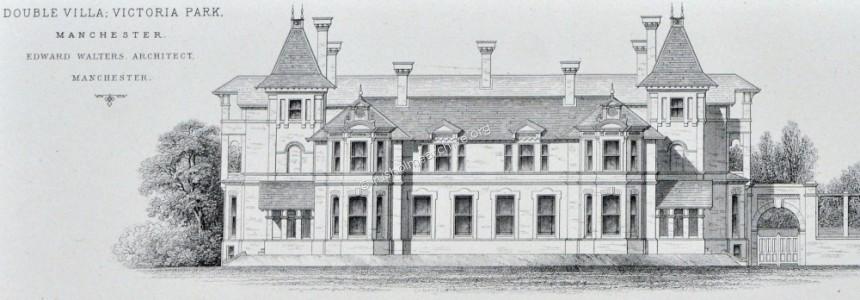Rusholme & Victoria Park Archive
A swimming pool in Rusholme?
*In May 2024 I was contacted by Carl Evans who has built a very interesting website, "Baths and Wash Houses Historical Archive”:https://rusholmearchive.org/a-swimming-pool-in-rusholme
His question was simply to ask if I knew whether there had been a swimming pool in Rusholme? He had in his possession a document written in 1945, by the retiring Superintendent, (Albert Teasdale), of the Manchester City Council Baths and Wash Houses dept, that referred to a swimming pool in Rusholme. More specifically, the reference was, “There was also "Royles" Baths, * built by Samuel Royle, a member of the City Council and a most respected resident in Rusholme. These baths were located at the rear of Wilmslow Road, between Monmouth Street - Claremont Road, and Moor Street, adjoining which was a skating rink. The date of opening is not known, but the premised were offered to the Manchester Corporation Baths & Wash Houses Committee on October 22nd, 1889. The offer was not accepted, and eventually the establishment was closed down sometime after the year 190l.”
* I am not sure if Teasdale would have known if Royle had actually built the baths.
As I had never come across any information about a swimming pool in Rusholme, it obviously prompted me to see if I could find anything that would confirm the existence of a pool.
My first resource was the National Newspaper Archive, and it proved to be very successful as I found the following 2 items in the Manchester Courier that referred to swimming in Rusholme.
Friday 21 June 1878, A SWIMMING BATH FOR RUSHOLME. To the Editor of the Manchester Courier
Sir, - I would beg to call your attention to the great want felt by the inhabitants of Rusholme and the neighbouring district of a swimming bath, and think that the building which was formerly the Manchester Glaciarium would be well suited for the purpose, and could be converted into a swimming bath at a small expense, besides being admirably situated. Perhaps this may catch the eye of some enterprising capitalist who would be willing to start a company, which would be a great boon to the surrounding neighbourhood, and I think should pay well – Yours,
A RUSHOLME INHABITANT.
Rusholme, June 17, 1878.
(The above letter was unfortunately, anonymous, but I have wondered if the author was Samuel Royle.)
The letter to the Editor did not appear to find any enterprising capitalist for a pool but rather more interestingly the report below from the Courier is about a swimming gala in 1888.
RUSHOLME SWIMMING CLUB: Friday 21 September 1888
“The second annual gala in connection with the Rusholme Swimming Club, was held at the Baths, Monmouth-street, Rusholme, last evening. Mr. W. T. Gunson, member of the City Council, presided, and there was a crowded attendance. In opening the proceedings, the Chairman said that everyone now recognised that public baths were a necessity not only for towns like Manchester but for places of much less dimensions, (Hear, hear.) He could remember the time when it was seriously debated in the City Council whether they were necessary, but he was glad to recognised now that were a necessity, (hear, hear). The programme was a long and interesting one, the events including a hurdle handicap, object walking, walking the greasy pole, polo match and races for novices. The principal event was the race for the captaincy and vice-captaincy of the club, distance 15 lengths. There were five entries but only three appeared on the diving board, namely Mr Buckley, Mr. Barker, and Mr Butler. These competitors all started from “scratch” but it was soon seen that Mr Buckley had the race in his hands. He led from the first, and swimming very leisurely, was declared the winner by a full length of the bath. Messrs Barker and Butler struggled gamely for a second place, and the first named gentleman only managed to secure the vice-captaincy by a few inches. A very clever and graceful exhibition of swimming was given Miss Rhoda, who was loudly applauded during her performance, at the close of which she was presented with a pretty plush satchel by the Chairman. Mr L J Reuss officiated as referee; Mr J Bowers of the Manchester Corporation Baths, was the starter; and Messrs. Carroll, Vicars and Stott were stewards. At the close of the entertainment, which was very successful, the Chairman presented the prizes to the several winners.”
This was a clear indication of swimming activities in a Rusholme pool, and I remembered a comment from Carl Evans about a map that I had used to show the location of the Rusholme Ice Skating Rink. On this map Carl drew my attention to ‘baths’ that were adjacent to the skating rink – could this be the pool? The map below was published in 1879, two years after the closure of the Rusholme Ice Skating Rink and I have marked the baths in red.
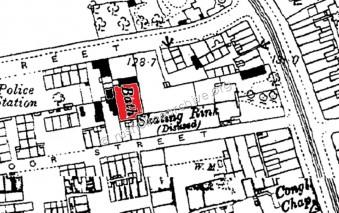
Presumably the ice-skating rink had needed thousands of gallons of water and were the ‘baths’ the tank that ensured the ice rink always had an adequate supply of water?
I thought perhaps a search of the minutes of the Manchester Baths and Wash House Committee would provide some detail about the proposed sale of the baths in 1889, so I arranged with the Manchester Central Library Archives to see the minute books and search for more information.
This was not my first time searching Manchester City Council minutes, and I still find it impressive when the large leatherbound volume is placed on the desk, filled with carefully written copperplate in black ink.

The minutes of the Committee meeting held in October 1889 contain details of an offer made by W. Provis, agents acting on behalf of Samuel Royle, a corn dealer residing at 98 Wilmslow Road and a Conservative councillor for the Rusholme ward. The letter was prepared using a typewriter (invented in the 1870s), and four extracts from it are included below.
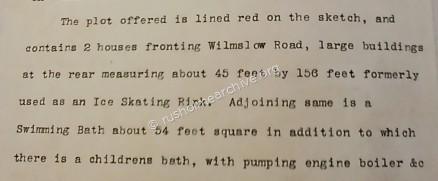
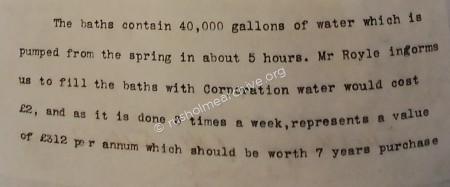
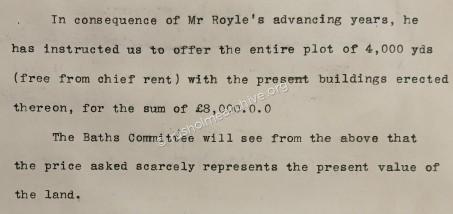

Looking at the contents of the letter each of the sections above raised a particular query and I will briefly discuss the salient point.
1. The most significant is the reference to a ‘Swimming bath about 54 feet square’, that could mean the bath was barely more than 7 feet by 7 feet?? Hardly room for the swimming gala that was described in the newspaper report and if you have another look at the map above, if it was drawn accurately to scale you can see the bath is almost the same size as the skating rink. Obviously within that space there is the children’s bath, pumping engines etc but I am still wondering if the 54 sq. ft is a mistake?
2. According to my calculations if the volume of water is 40,000 gallons this equals 5347 cubic feet, if you presume the bath was 6 foot deep then this becomes an area of 890 sq. ft. i.e. approx. 90 ft. by 10ft? This might be a more plausible size for the pool. (If you are a mathematician you might care to check my calculations?)
3 & 4. I am wondering when reading these two items if Councillor Royle had an eye to the prospect of making a substantial profit from the sale. The background that I found when researching this page is that Councillor Royle had a single share in the bankrupt Ice-Skating company. When the company was in administration Royle would, no doubt, have been in contact with the bankruptcy trustees and aware the trustees were probably anxious to sell the assets of the company. Having one share his loss was only £5 whereas other shareholders would have lost considerably more – did this put Royle in a position to acquire the land and property at a knock-down price? If it was in 1877 after the closure of the Skating Rink, why did it take a decade for a swimming club to be established?
Is it possible that the baths were only opened after 1885 when Councillor Royle could demonstrate to the Baths and Wash House Committee that there was a viable swimming bath with plenty of room for further expansion? It is worth noting that it was only in 1885 that Rusholme had been incorporated into the City of Manchester. As a newly elected Councillor in 1885 Royle perhaps had a view that Manchester was very wealthy, perhaps to the Council £8000 was a trifling sum? I think that sum was in fact quite substantial at that time and have checked the value of that figure at the website ‘Measuring Worth’ . The website provides relative valuations in respect not just of RPI figures but comparisons to the cost of labour etc. The chart is reproduced below with thanks to Measuring Worth. For further information about the values in the chart visit https://www.measuringworth.com
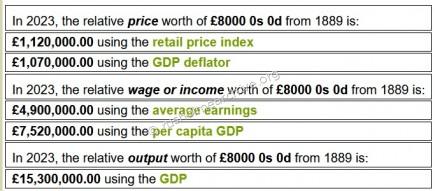
Perhaps the price asked for the land and buildings seemed reasonable to Councillor Royle, but not surprisingly the Committee asked for more information about the site and buildings. I found no mention in the minutes of any action by members of the Committee or Council officers until C.W. Provis again wrote to the Committee in July 1890. Reading the letter I wonder if there was an element of possibly reducing the price, (?), but nevertheless asking for a firm reply, see the letter below.
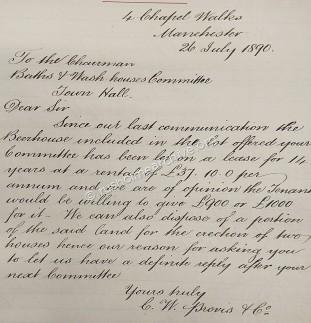
The response from the Committee was very concise, see the Minute below.

I carefully examined the minutes of the Committee to see if there was any specific reason for not buying the property, but found nothing. Whether committee members had a rational view that a purpose-built pool with comprehensive facilities would be preferred, I still have a lingering thought in my mind that perhaps the Committee did not warm to the idea that Councillor Royle was possibly to make a substantial profit from Manchester ratepayers.
Their opinion of Councillor Royle may possibly have been influenced by a report in the Manchester Evening News, (4th Feb. 1890) which appeared during the period they were considering his proposal to sell the baths.
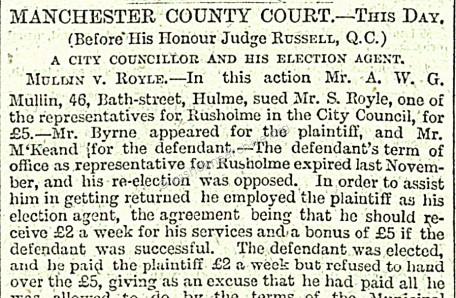
The article continued, “The defendant was elected, and paid the plaintiff £2 a week but refused to hand over the £5, giving as an excuse that he had paid all he was allowed to do by the terms of the Municipal Elections Act, 1854. It was contended that if he paid the money he would be guilty of an illegal payment. Mr. M. Keand said the defendant had made a declaration to the effect that his expenses in the contest had been £39.55. ld. The limit allowed the Act was £41.16. 3d., so that if the defendant paid the £5 he would be guilty of an illegal act, and would render himself liable to imprisonment, while the plaintiff himself would be liable to a fine £50. Mr. Byrne submitted that even if this proposition was granted the plaintiff was still entitled to the difference between the £39 and the limit allowed by the Act. His Honour ruled that under the statute, the payment would be an illegal one. Mr. Byrne then withdrew the claim without calling any witnesses.”
I do wonder if the Committee members having seen this item in the local press, (and no doubt discussed by other Councillors), thought that the recently re-elected Councillor Royle was perhaps a man of ‘questionable propriety’ and they should not have any further dealings with his proposed sale.
During this period of the election in Rusholme I did find another interesting report concerning Samuel Royle.
Manchester Times - Saturday 02 November 1889.
In Rusholme the fight was between two Conservatives, Mr. S. Royle, the retiring member, and Mr. W. Johnson, solicitor. Very little excitement was visible among the electors, but there was evidently some feeling between the candidates, if the cry of “Vote for Johnson and intelligence " may be taken as a criterion. Mr. Johnson described himself further as the ratepayers' candidate, and in one of his bills he associated his name with public baths. The retiring member, on the other hand, asked the electors to vote for " Royle and experience," for Royle their " tried and trusty representative,” and “ Royle and no dictation”.
The reference by Johnson about public baths was presumably intended as a jibe against Royle??
Coming back to the future of the baths after the Council refused his offer, I thought that I would again search the National Newspaper Archive using search terms such as ‘swimming’, ‘Rusholme Baths’ etc and I found just one item in the Manchester Evening News, dated 29th May 1891. (In poor print condition I copied the notice details.)

Whether those lessons were well attended is not known, but as I did not find any other notices in the local press for swimming lessons in the Rusholme Baths I wonder if it was a successful venture?
Carl Evans kindly searched Slaters Manchester Directories and found entries dated between 1886 and 1895 confirming the baths were in Monmouth Street. It was interesting to note that the 1886 entry referred to the baths having a manager, Mr. Thomas Anlt. The reference to the baths in 1895 was also useful because it did indicate Samuel Royle continued to be identified as the proprietor. (Slater's Manchester & Salford Directory (1895) [Part 2 Trades, Institutions, Streets, etc.], Rusholme Swimming Bath, Monmouth st. R-8. Royle. Proprietor).
Pursuing the note in the letter from CW Provis that Councillor Royle was in ‘advancing years’ I did some brief genealogical research. I found that Samuel Royle was born in 1818 and eventually died age 77 in 1895, probate being granted on his estate of £6768.19.6p. (Once again checking www.measuringworth.com even at simple RPI figures Royle would have been quite wealthy).
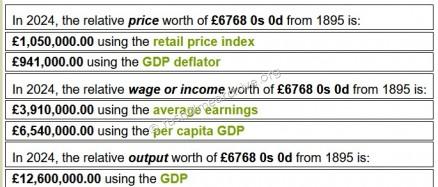
Whatever happened to the pool and buildings after the death of Samuel Royle I do not know, presumably the executors of his estate, (his three children), were anxious to realise the assets and disposed of all property.
I can only presume that the tank, (or pool?) was eventually filled in and the site used for some other purpose. Curiously, the aspect of water at this location was still significant because a map of 1915 (?) does show a laundry on the site. Perhaps the laundry was able to do the washing in the pure spring water?
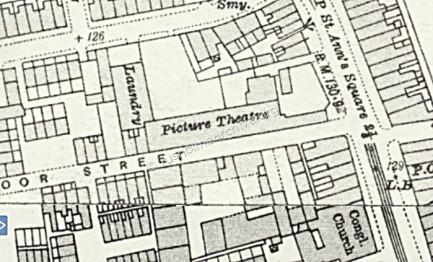
The disused skating rink eventually became known as the Victoria Hall and used, I think, during the early 1900’s as a public ballroom until it was eventually to become the Trocadero Cinema in 1912. On the night of 15th September 1975, a fire broke out in the building, causing considerable damage. It never re-opened and was demolished in the late-1970’s.
If you have read this through this story, I have to provide a caveat that I have drawn the conclusion that the ‘baths’ were part of the skating rink and that Cllr Royle had not been responsible for building the pool – perhaps I am mistaken in my judgement?
